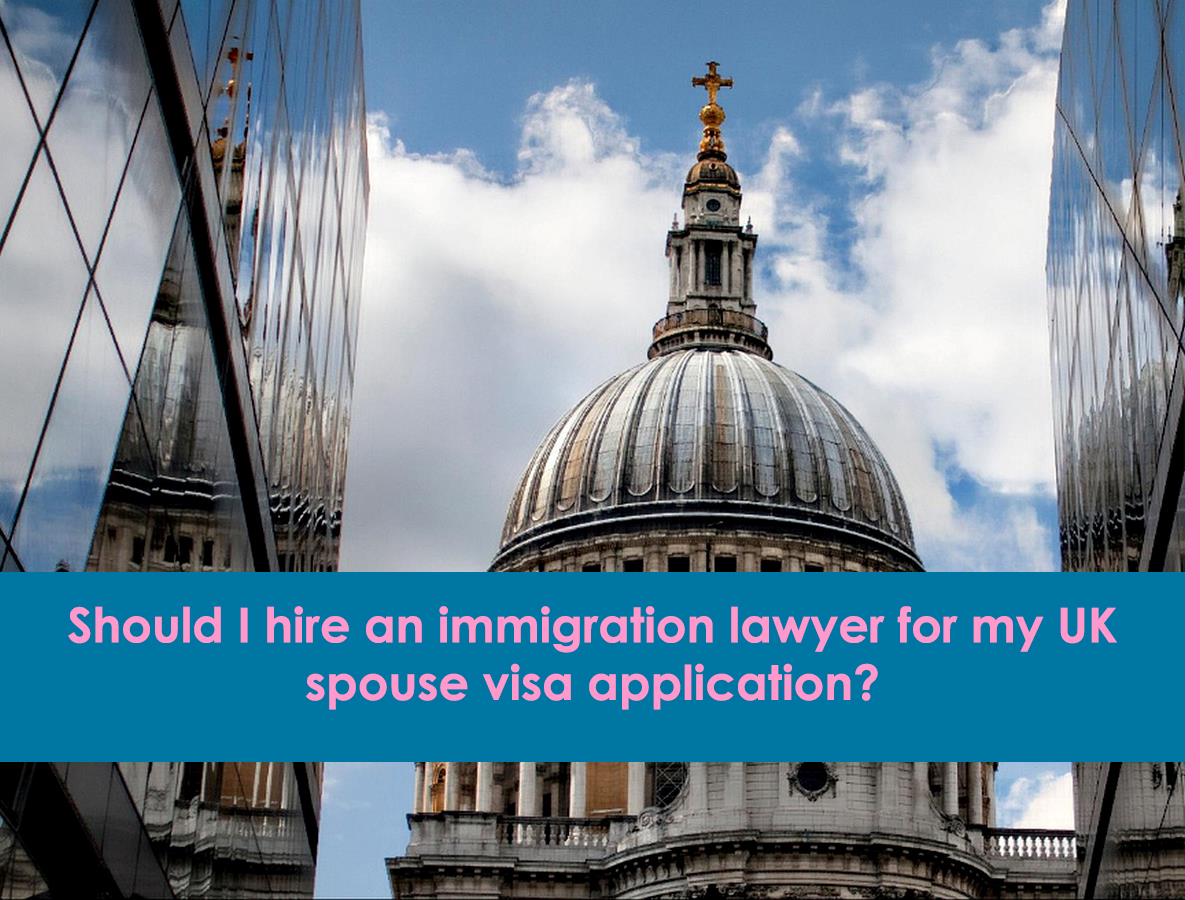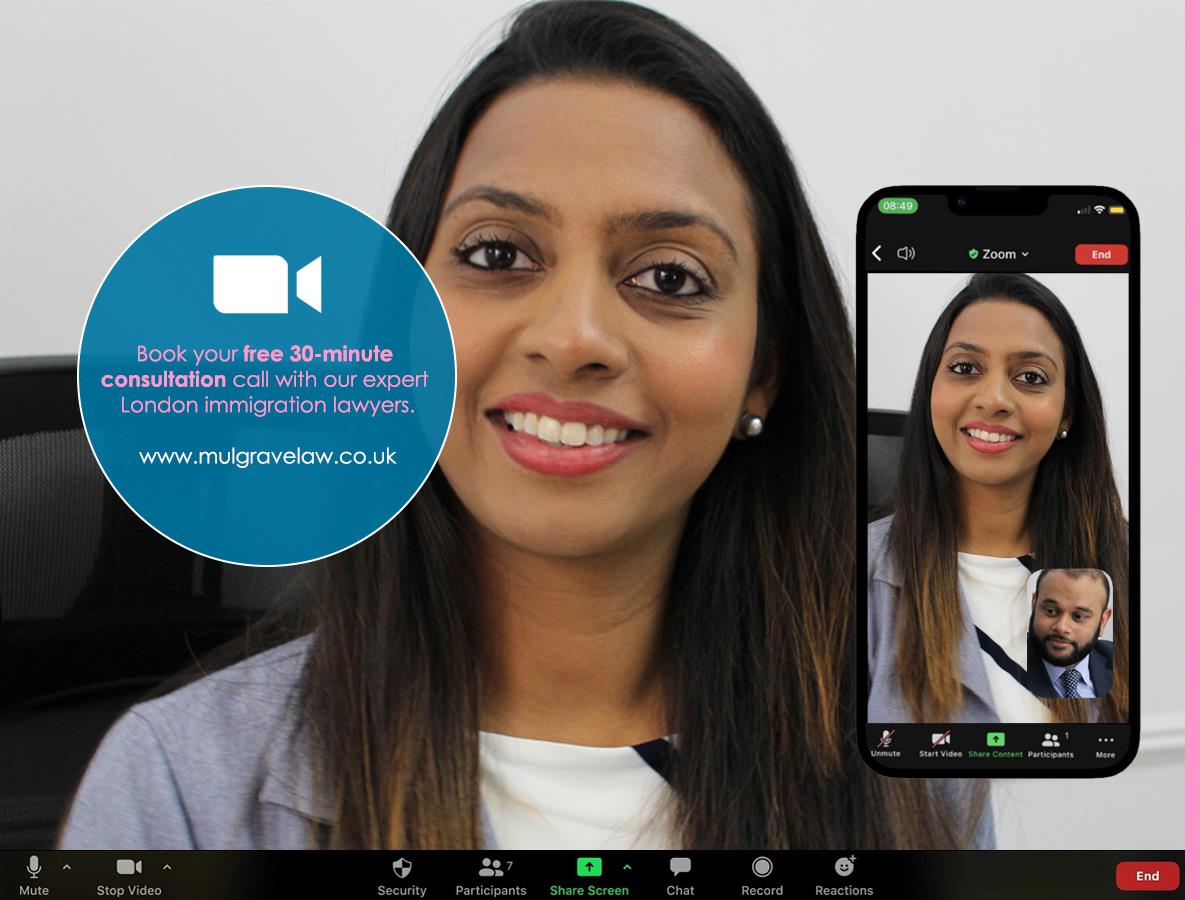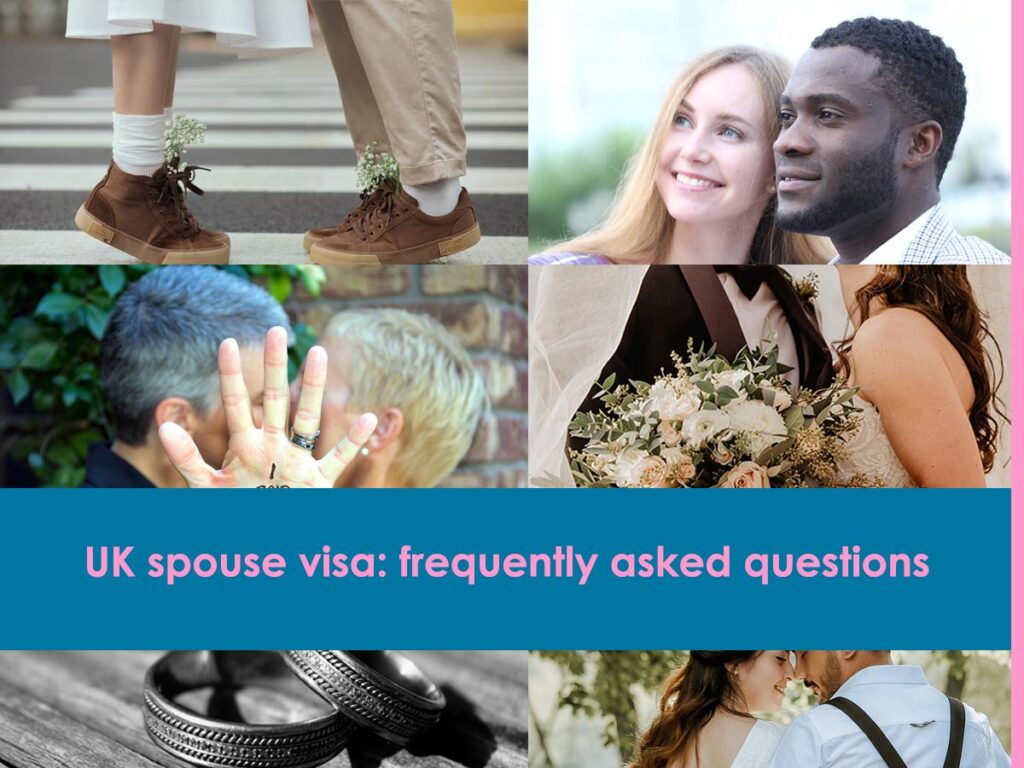Applying for a UK Spouse Visa is one of the most common and important pathways for couples who want to live together in the UK. While it offers a clear route to joining a partner or spouse, the process is complex. Applicants must meet strict financial requirements, provide a wide range of documents to prove their relationship, and demonstrate that their marriage or partnership is genuine and legally recognised. On top of this, navigating the application forms, understanding eligibility rules, and ensuring compliance with UK immigration law can be stressful, especially for those applying from abroad or for the first time.
With careful planning and expert guidance, however, the process can be much smoother, giving couples confidence that their application meets all Home Office standards.
In this article, our immigration solicitors at Mulgrave Law answer the 21 most frequently asked questions about the UK Spouse Visa.
1. Who can apply for a UK spouse visa / am I eligible?
To be eligible for a UK spouse visa, applicants must be 18 years or older and legally married or in a civil partnership with a British citizen or someone settled in the UK. You and your partner must intend to live together permanently in the UK, and you must meet key requirements, including financial thresholds, suitable accommodation, and English language proficiency
2. From where can I make my UK Spouse Visa application?
You can apply either from outside the UK (entry clearance) or inside the UK (switching/extending).
- Outside the UK: Apply via the UK Government website and attend a Visa Application Centre (VAC).
- Inside the UK: Switch from an eligible visa (e.g., student, work).
Visitor visas are not eligible.
3. How do I make a UK Spouse Visa application?
The process involves three stages:
- Online form submission: Complete the official form for a spouse or partner of a British citizen or settled person.
- Supporting documents: Upload evidence of relationship, finances, and accommodation.
- Biometrics & decision: Attend a biometric appointment; the Home Office will review your application.
4. What documents are required for a UK Spouse Visa application?
- Applicants must provide evidence showing both the genuine relationship and eligibility:
- Marriage certificate or civil partnership document
- Proof of relationship: photos, messages, joint bank accounts, tenancy agreements
- Accommodation evidence: tenancy/mortgage or homeowner letter
- Financial evidence: payslips, bank statements, self-employment accounts
- Passport and biometric residence permit
- English language certificate
For more guidance, see our spouse visa services page.
5. What is the financial requirement for a UK Spouse Visa (2025)?
- Minimum income: £29,000 per year. Sponsors can meet this through:
- Employment or self-employment
- Non-employment income (rent, dividends)
- Cash savings above £88,500
- Combination of income and savings
6. Will the UK recognise my overseas marriage?
Yes, if legally recognised abroad and meets UK standards. Invalid or prohibited marriages (e.g., polygamous) are not recognised.
Not yet married? A UK Fiancé Visa lets you enter the UK for six months to marry.
7. How long will it take for the Home Office to decide my UK Spouse Visa application?
Most applications are processed within a fairly predictable timeframe but it does depend on where you’re applying from and whether you choose a faster service.
If you’re applying from outside the UK, the Home Office usually makes a decision within around 12 weeks from the date of your biometric appointment. Those who apply from inside the UK (for example, switching from another visa) can generally expect a decision within about 8 weeks.
You may be able to use a priority service, which can reduce the waiting time to around 6 weeks for applications submitted from overseas. For applications submitted in the UK, a super priority service is available, offering a decision by the next working day though these services cost extra and are not always available in every country or visa centre.
Delays can occur if the Home Office needs to check extra information, request missing documents, or look more closely at your circumstances. That’s why submitting a complete, and well organised application from the start is so important.
8. Can I work in the UK on a Spouse Visa?
Yes. You can work, be self-employed, study, or start a business. You cannot claim public funds.
9. What if my partner changes job after I arrive?
If your partner changes jobs after you arrive in the UK, your spouse visa remains valid and you can continue living and working in the UK. However, when it comes time to renew your visa or apply for settlement, you will need to provide updated financial evidence to show that you continue to meet the Home Office’s income requirements. It’s a good idea to keep records of their new employment to avoid any delays or complications later.
10. Can we live with relatives or in shared accommodation?
You can live with relatives or in shared accommodation as long as the property meets the Home Office’s adequacy standards. This means the home must have enough space for all occupants and be safe and suitable for everyday living. When applying, you will need to provide evidence, such as a tenancy agreement, mortgage statement, or a letter from the homeowner, confirming that you have the right to live there.
11. When can I apply for settlement and British citizenship?
You can apply for settlement in the UK, also known as Indefinite Leave to Remain (ILR) after five years on a spouse visa, provided you’ve lived in the UK continuously with your partner and continue to meet the financial, accommodation, and English language requirements. Once you have ILR, you can generally apply for British citizenship, giving you full rights as a UK citizen. Planning ahead and keeping accurate records of your residency and relationship history can make both applications smoother and help avoid unnecessary delays.
12. What if my Spouse Visa application is refused?
Refusals are stressful, but it’s important to understand that it doesn’t necessarily mean the end of your plans to live together in the UK. Common reasons for refusal include missing or inconsistent documents, not meeting financial requirements, or insufficient evidence that your relationship is genuine.
If your application is refused, you have options such as submitting a fresh application or an appeal. Working with an experienced immigration solicitor can make a real difference they can help you identify any gaps, ensure your documents are properly organised, and prepare a stronger, more robust application, increasing the chances of success the next time.
13. What can you do on a spouse visa in the UK?
A spouse visa gives you the freedom to live and work in the UK without restrictions, whether that’s taking up full-time employment, being self-employed, or starting your own business. You can also study, volunteer, or take courses to further your skills. Travel in and out of the UK is permitted, giving you flexibility for family or personal matters abroad.
After five years on your spouse visa, you can apply for settlement (ILR), which opens the door to long-term residence and eventually British citizenship. It’s important to remember, however, that you cannot claim public funds, and you must continue to live with your sponsor to comply with visa conditions. Keeping evidence of cohabitation and activities during your visa period can help with future applications beyond the spouse visa.
14. What happens after 5 years on a UK spouse visa?
Apply for ILR:
- Pass Life in the UK Test
- English language B1
- Maintain financial eligibility
- Once ILR is granted, you can live/work freely and eventually apply for citizenship.
15. What is a UK fiancé visa?
A UK Fiancé Visa is designed for couples who are not yet married or in a civil partnership but plan to do so in the UK. It allows the applicant to enter the UK for up to six months to get married or form a civil partnership with their UK based partner.
While on a fiancé visa, you cannot work or access public funds, so it’s important to plan your finances accordingly. Once the marriage or civil partnership takes place, you can switch to a spouse visa from within the UK, which then allows you to live, work, and study freely, and eventually count toward settlement after five years.
16. Is the UK spouse visa a settlement visa?
Yes. Temporary visa (2.5 years) counts toward five-year route to ILR and citizenship.
17. How much does it cost to renew your spouse visa?
If you are extending your visa from within the UK, the cost currently in 2025 is £1,321. Applying from outside the UK is higher, at around £1,938. In addition to the application fee, you must also pay the Immigration Health Surcharge (IHS), which is £1,035 per year, giving you access to the NHS while you live in the UK. Fees may be subject to change, it is always best to check for the latest update.
18. Accommodation Rules
When applying for a UK spouse visa, you must show that you have adequate accommodation for yourself, your partner, and any dependents. The Home Office requires that your home is safe, suitable, and not overcrowded according to UK housing standards.
Evidence can include a tenancy agreement, mortgage statement, or a letter from the homeowner confirming that you have the right to live there. Even if you are staying with relatives or in shared accommodation, the property must meet these adequacy requirements set out by the Home Office.
19. Can I claim benefits or public funds?
No. You cannot access public funds (Universal Credit, housing benefits).
20. Spouse Visa Rules on Prohibited Family Relationships
The UK has strict rules regarding who you can marry or form a civil partnership with when applying for a spouse visa. Close blood relatives such as siblings, parents and children are not allowed to marry under UK law, and any application involving a prohibited relationship will be refused. Polygamous marriages or relationships that are not legally recognised in the UK will not be accepted. Ensuring your relationship is legally valid and compliant with UK law is essential before applying.

21. Should I hire an immigration Lawyer / Solicitor for my UK spouse visa application?
Applying for a UK spouse visa is overwhelming for most people, with all the paperwork, financial requirements, and rules about relationships and accommodation. That’s where an immigration lawyer or solicitor can really make the process easier and less stressful.
An immigration solicitor can review your eligibility and guide you on the best visa route for your situation. They’ll help you organise and prepare your supporting documents properly, so nothing is missing or unclear. Whether it’s financial evidence, proof of your relationship, or overseas documents, they know exactly what the Home Office needs to see.
If your application is refused, a solicitor can help you understand why and advise on the best next steps, whether that’s an appeal or a fresh application. They can also support you with renewals, Indefinite Leave to Remain (ILR), and eventually British citizenship applications, making the whole journey smoother.

About the author: Mulgrave Law
Mulgrave Law is a London based immigration law firm specialising in UK spouse visas, family immigration, and settlement applications. We provide clear, practical advice to couples and families seeking to live together in the UK.
Our team also advises on skilled worker visas and sponsor licences. Known for meticulous preparation and approachable service, we help clients navigate the UK immigration system with confidence. Book a consultation today to get tailored guidance for your immigration matter.

